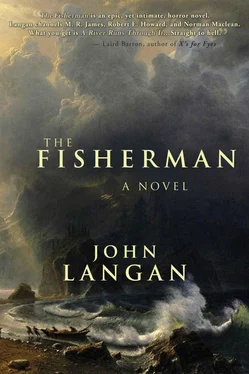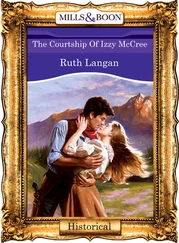“It was in my grandfather’s fishing journal,” Dan said.
I had no response — had no notion what he was talking about.
“He was a fisherman, too,” Dan said. His voice shook with the strain of the sight before us. “He and my dad used to go fishing on weekends. Sometimes, they took me. Not too often, but sometimes. He kept a record of the places he’d fished. It was just a ruled notebook, the kind of thing you get for school. He was pretty thorough. For each spot, he recorded the date he went, the hours he spent there, the weather, the condition of the water, the lures he used, and the fish he caught. Once in a while, he’d add a comment underneath the data: ‘Good luck above dam,’ or, ‘Hooked huge catfish near 32 bridge but lost him.’ When he returned to a site, he updated the entry in different-colored ink. I never knew about his journal. He wasn’t exactly what you’d called a forthcoming man. It wouldn’t have mattered much if I had been aware of it. I liked to fish, but I wasn’t interested in that kind of exhaustive note-taking.
“Then, this past February, my cousin, Martine, came to visit with her family. I think I told you about that. Right at the last possible minute, as they’re loading the car for the trip back to Cincinnati, she reaches into her suitcase and comes out with Grandpa’s journal. ‘Here,’ she says. I had no idea what she was handing me. She’d had the book bound in leather, with ‘Fishing Journal’ embossed on the cover in gold lettering. I thought it was a blank book, and she was going to tell me to write my feelings in it. She teaches high school English, and we’d talked about that. Well, she’d talked about it, as what she called a ‘therapeutic exercise.’
“But no, it was our grandfather’s record of his fishing trips. Her mother had come into possession of it after Grandpa’s death, and she gave it to Martine. I couldn’t figure out what Aunt Eileen would have wanted with the notebook. From what I understood, she’d always been focused on religion, to the point she’d flirted with converting to Catholicism, so she could become a nun. No one had mentioned her being interested in fishing. She wasn’t, Martine said. Her mother hated fishing. She was jealous of it, of the time and attention Grandpa gave to it, and of him sharing it with my father. I had no idea; no one else did, either. I’m surprised she didn’t burn the journal, you know, take revenge that way. When Martine’s older son, Robin, was born, her mother passed the journal to her, for the baby. Robin wasn’t interested in fishing, though; neither was his younger sister. My cousin left the journal in her dresser drawer, said she’d practically forgotten it. Then, after,” his voice hitched, “everything happened with Sophie and the kids, and you and I started fishing together, Martine remembered our grandfather’s notebook. She dug it out from underneath the socks and underwear and decided it would be of more use to me than it had been to anyone in her family. She found a place to give the journal a nice binding, and here it was. ‘I hope you’ll find something in these pages that will be of help to you,’ she said.
“It was a while before I looked inside the notebook. To be honest, Abe, I wasn’t sure I wanted to keep fishing with you. No reflection on you: I wasn’t sure I wanted to continue fishing, period. You probably noticed, things with me got a little worse this winter. I know I kind of fell apart that night you had me over for dinner. As long as we were fishing, I was — I wasn’t good, not by any stretch of the imagination, but I was able to go from one day to the next. After the season ended, and I put away my rod and tacklebox in the spare room, everything became harder. It didn’t happen overnight. There were still the holidays and visits from family to distract me. But more and more, it seemed to me I was caught, trapped in a whirlpool that had swept me in the morning that truck — that truck…”
Dan shook his head fiercely, tearing his gaze from the thing in front of us. Focusing on me, instead, he said, “A maelstrom: that’s what they call an especially big and bad whirlpool, the kind of funnel in the ocean that could draw down a ship. I was in a maelstrom, spun around and around a cone of black water, my wife and my children somewhere in there with me, their screams and cries impossible to pinpoint. The longer it had hold of me, the harder it was to believe that there had been anything else, any standing beside the Svartkil talking about work and waiting for a bite. All of those trips, those days sitting on the bank of this stream or that, were a dream, a delusion I’d foisted on myself to escape that relentless spin. Do you know — where the accident happened, they put a light, there.”
“Yes,” I said.
“Most mornings, I drive down there. We’re talking three, four a.m., when it still feels like nighttime. I have trouble sleeping very long. I pull off the road, turn off the car, and sit staring at that light.”
“I know,” I said.
“You do?”
“You told me,” I said, “the night you came over for dinner.”
“I did?”
“After a lot of wine.”
“Oh.” For a moment, the thread of Dan’s narrative appeared to have slipped through his fingers. “Huh,” he said. “Okay. So. I watch the traffic light and think about things. I probably said what kind of things, didn’t I?”
“Yeah.”
“Night after night — or morning after morning — it’s the same. The light cycles through its commands and the maelstrom drags me deeper. I’m aware how bad conditions at work are, and I understand that I’m inviting management to add my head to the pile of those they’ve hacked off, already, but I can’t muster enough concern to lead to any action. I watch the green replaced by yellow, yellow by red, and…”
“Yeah.”
“Then, one morning, I glance at the passenger’s seat and there’s Grandpa’s fishing journal. I can’t remember putting it there — can’t remember why I would have put it there — but that’s all right. I go through a lot of my day on autopilot, I’ve noticed. Maybe I thought it was something else. Doesn’t matter. My curiosity’s been pricked. I pick up the book and start turning the pages. They’re stiff with the dried ink. As I go, I recognize some of the names he’s written. The Esopus. The Rondout. The Svartkil. I pause at some of the entries, trace my finger over the words as I try to decipher the old man’s handwriting. He caught whatever would take his hook, but it seems he preferred catfish. Caught an enormous channel cat right where the Rondout empties into the Hudson. Reading his notes, re-creating the days he’d had — it’s comforting, in a strange kind of way. I look at the pages for places I haven’t been. I see an entry for Dutchman’s Creek.”
I don’t mind saying, I was feeling a tad story’d-out. First Howard’s extravaganza, and now Dan’s more restrained example, and in the meantime, a human skull wrapped in translucent skin was grinning at me over a mouth of fangs. “So that’s how you found out about this place,” I said. “Great. Now—”
“‘Saw Eva,’” Dan said. “That’s why we’re here. Underneath all the usual information, he’d written those two words. Eva was his wife — my grandmother. She died in 1945, on New Year’s Day. A stroke, I think. My dad was only seven at the time, and was never able to find out exactly what had happened. Anyway, the point is, the entry Grandpa made for Dutchman’s Creek was dated July 1953. My grandmother had been dead eight and a half years, which means she couldn’t have accompanied him on the trip.
“I know.” Dan held up his hand, palm outward, a cop halting the protest about to leave my mouth. “I flipped to the first page of the book and checked the date. He’d started this log in May of 1948. This wasn’t an earlier entry that had been misdated. I checked the other pages in the journal, every last one of them. There were no other references to seeing my grandmother. It wasn’t some kind of code for a good day of fishing. It was — I didn’t know what it was. Saw Eva.”
Читать дальше












